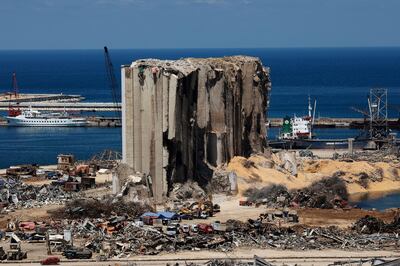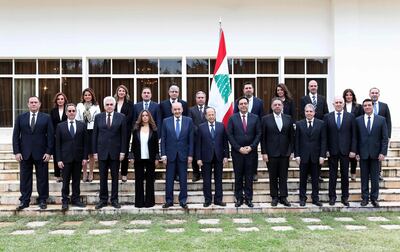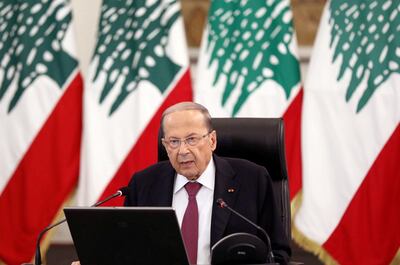When asked why did he not act upon information he had received about the ammonium nitrate stored at Beirut’s port that later blew up much of the city centre, the Lebanese President Michel Aoun answered that “the port lies outside [his] jurisdiction”. That answer echoes a sentiment prevalent among most present and former holders of public office in Lebanon. Whenever pushed into a corner by questions about their ineptitude, Lebanese officials answer: "Ma khallouna (they wouldn’t let us)” has been repeated so much that it has invited a great deal of sarcasm and cynicism among Lebanese. It is a common joke to refer to the entire political class as the “Ma Khallouna” party, and politicians have only themselves to blame.
In 1959, Lebanon created a Civil Service Council tasked with professionalising public administration and neutralising it from political bickering. The problem began in 1989, when Lebanon's political leaders met in the Saudi Arabian city of Taif to form a new national pact that would put an end to the 15-year civil war. The resulting Taif Agreement stipulated, among other things, the elimination of sectarianism from politics and public sector jobs, though for an interim period this would exclude "the top-level jobs and equivalent jobs which shall be shared equally by Christians and Muslims without allocating any particular job to any sect".

What was supposed to be a short-term exemption in a phased plan of eliminating sectarian politics became instead an entrenched political tradition. To this day, Lebanon’s top jobs are allocated with sectarian power-sharing in mind (and, in violation of the spirit of the Taif Agreement, particular jobs are allocated to specific sects).
As a consequence, civil service appointments have also become political appointments that bypass the Civil Service Council. This process accelerated further over the past 15 years, as competing political forces fought over civil service appointments across the state apparatus – including the Port of Beirut. The politicisation process manifests itself not only in recruitment but also in management procedures such as dismissal, promotion and transfer to another positions.
The Lebanese civil service has by now become a complex web of what political scientists call “principal-agent” relationships.
What does that mean? A “principal-agent” relationship is one in which someone (the principal) engages another person (the agent) to carry out a task on their behalf and, in doing so, delegates a certain amount of decision-making authority to the agent. In democratic systems like that of Lebanon, this relationship exists between citizens and politicians on the one hand, and politicians and civil servants on the other. Citizens entrust politicians to deliver certain goods and services, and politicians entrust civil servants to help them deliver these goods and services.
The principal-agent relationship, however, can give rise to something political scientists call the “principal-agent problem”. It may seem fairly obvious, especially in corrupt countries: agents have their own interests, and can be selfish. The deep and extensive politicisation of the civil service in Lebanon has created an excessive form of this problem whereby multiple principals and multiple agents compete against one another, at the expense of public good.
Two days after the blast at the port, the French President Emmanuel Macron made a hasty visit to Beirut to call for a new political order for the country. The IMF, the EU, the US and other donor countries and institutions have made economic reforms a condition for the provision of financial assistance to Lebanon. But neither economic nor political reforms will be effective if the principal-agent problem of Lebanon's public administration is not addressed. What the Republic of Lebanon urgently needs is what the 19th-century German sociologist and philosopher Max Weber called "neutral competence" – professional civil servants who are responsive to the public and not to politicians.

That means that the starting point for Lebanese recovery has to be the implementation what was actually agreed in the Taif Agreement more than 30 years ago, by making all appointments to the civil service apolitical and subject to administrative procedures and technical skills only. Public services in many countries today are assessed through numerous performance indicators, which make it possible to hold civil servants accountable and ensure they are directly responsive to public feedback.
Luckily, there are some good experiences from which Lebanon can learn. In Dubai, public sector institutions are evaluated directly by the public through an annual Dubai Customer Happiness Index. Elsewhere in the UAE, government agencies and departments are assessed and evaluated through professional administrative procedures, following the so-called Government Excellence Model; excellence awards and prizes are handed out annually to top performers. Political intervention becomes necessary only to ensure public service responsiveness to public expectations.
Recruitment of top civil servant jobs in Lebanon need to change immediately to become independent of political manipulation. In France, the top 800 positions in public administration are pulled from professional bodies and elite training schools, especially from the National School of Administration. In the UK, recruitment is organised autonomously by each authority in a decentralised procedure according to merit. Even where they are political appointments, as is the case in the US, checks and balances are put in place, such the requirement for approval of all presidential appointments from Congress.
In countries with weak governance systems like Lebanon, the politicisation of civil service recruitment and management has brought with it nepotism, corruption, incompetence and indifference. Add to that the principal-agent problem that exists between some members of the political class and foreign governments and the conditions that led to the horrific explosion at Beirut's port became self-evident.
Sami Mahroum is a senior fellow at the Issam Fares Institute for Public Policy and International Affairs at the American University of Beirut and a professor at the Free University of Brussels




















